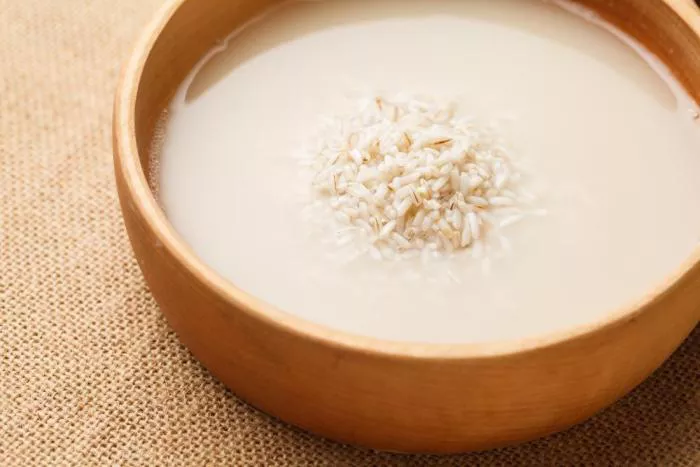Rice water has taken TikTok by storm, becoming a popular DIY remedy for achieving fuller, longer hair. While the internet has helped revive this ancient beauty practice, its use dates back centuries to regions like China and Japan, where it was traditionally used to nourish and hydrate the scalp, as well as enhance skin radiance. But the question remains: does rice water really live up to the hype? Let’s take a closer look at what rice water offers, how to use it, and whether it is the magic potion TikTok claims.
Benefits of Rice Water on Hair
The most prominent claim circulating on TikTok is that rice water stimulates hair growth. Many videos feature users boasting noticeable improvements in hair volume and length after only a few weeks of use. However, while these viral transformations may seem convincing, it’s important to remember that most of these claims are anecdotal. Both Hadley King, MD, a board-certified dermatologist in New York City, and Bridgette Hill, a certified trichologist, agree that more scientific research is needed to substantiate these hair-growth claims.
“There is no denying the vitamins and minerals in rice are key factors in healthy scalp and hair-growth function,” says Hill. Yet, she cautions that there’s not enough clinical data to prove rice water alone promotes significant hair growth.
Still, that doesn’t mean you should dismiss rice water entirely. According to Dr. King, rice water is packed with beneficial ingredients such as amino acids, B vitamins, vitamin E, antioxidants, minerals, and inositol, all of which may help strengthen hair strands. Hill adds that rice water can function as a protein treatment, helping to smooth hair and minimize frizz.
How to Use Rice Water for Hair
Incorporating rice water into your hair-care routine is relatively simple. Dr. King suggests using it as a rinse after shampooing and conditioning. You can pour the rice water onto your hair and let it sit for a few minutes, allowing the nutrients to penetrate. Alternatively, some users prefer to spray it onto their hair after washing and leave it on.
If you’re not into DIY treatments, you can opt for products that contain rice water. In such cases, it’s best to follow the manufacturer’s instructions for optimal results.
How to Make Rice Water for Hair
Making rice water at home is quick and easy. Dr. King recommends soaking half a cup of uncooked rice in two cups of water for about an hour. Once the rice has soaked, strain the liquid and store it in a spray bottle or container for easy application. Now you’re ready to use your homemade rice-water treatment on your hair.
Side Effects of Rice Water on Hair
While rice water is generally considered safe, Hill advises being cautious when mixing DIY treatments with store-bought or medicated hair products. “Incompatible ingredients in over-the-counter products can lead to adverse reactions,” she warns.
Another factor to consider is your hair’s porosity. Rice water may benefit those with high-porosity hair, as this hair type absorbs treatments more readily. “High-porosity hair allows for rice protein molecules to fill in the gaps in the cuticle, creating more strength and high shine,” says Hill. On the other hand, low-porosity hair may experience protein buildup, leading to potential damage over time. If you have low-porosity hair, it’s important to use rice water sparingly and avoid overuse.
Individuals with scalp conditions like dandruff or eczema should also consult a dermatologist or trichologist before incorporating rice water—or any food-based treatment—into their routine. Dr. King further emphasizes that if your primary goal is hair growth, rice water should not be used as a substitute for proven ingredients such as minoxidil, a well-known hair-growth treatment.
Rice-Water Treatments to Consider
If you don’t have time to make your own rice water, there are many hair-care products on the market that incorporate rice protein. Hill recommends the Briogeo Don’t Despair Repair Strengthening Treatment, which uses a proprietary rice-protein complex to strengthen hair. She also values the recommendation to follow up with a hydrating conditioner, which can be an important step when using at-home protein masks.
Dr. King suggests the Unite Hair 7Seconds Detangler, which contains hydrolyzed rice protein and offers moisturizing properties that protect hair from UV rays, heat damage, and breakage. For those looking to personalize their routine, Function of Beauty’s Custom Wavy Hair Shampoo includes fermented rice water, while Jooy’s Soothing Scalp Serum can help nourish and calm the scalp.
Conclusion
While rice water may not be the miracle hair-growth solution it’s sometimes made out to be, it certainly offers a variety of benefits for those looking to strengthen and smooth their hair. It’s rich in vitamins, minerals, and proteins that can contribute to healthier strands. However, its effectiveness may depend on your hair type and the other products you’re using.
As with any beauty trend, it’s essential to approach rice water with realistic expectations. If you’re serious about boosting hair growth, proven ingredients like minoxidil should still be your first choice. That said, if you’re looking for a natural way to add strength, shine, and smoothness to your hair, rice water is worth a try—just make sure you know your hair type and consult a professional if you have any concerns.
Ultimately, TikTok might have helped reintroduce an ancient beauty ritual to modern audiences, but rice water is best used as a supplementary treatment, not a cure-all.


